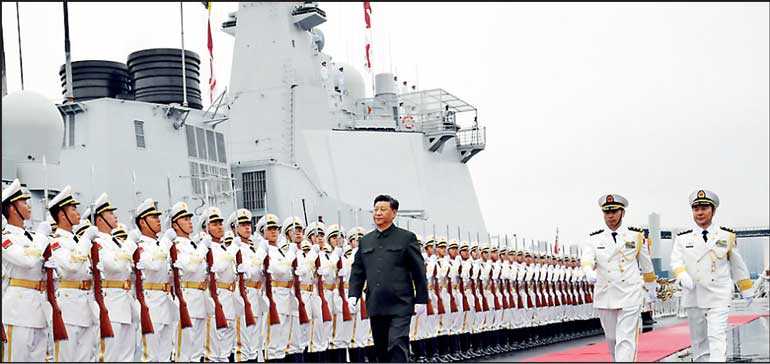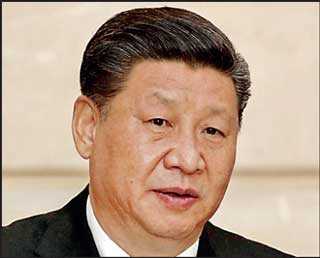Sunday Feb 22, 2026
Sunday Feb 22, 2026
Wednesday, 24 April 2019 00:00 - - {{hitsCtrl.values.hits}}

QINGDAO, China (Reuters) - The Chinese people love peace and countries should not threaten each other with the use of force, President Xi Jinping said on Tuesday as he kicked off a large-scale naval parade marking 70 years since the founding of China’s navy.
 |
Chinese President Xi Jinping holds a news conference after a meeting with French President at the Elysee Palace in Paris, France March 25, 2019 - REUTERS |
Xi is overseeing a sweeping plan to refurbish the People’s Liberation Army (PLA) by developing everything from stealth jets to aircraft carriers as China ramps up its presence in the disputed South China Sea and around self-ruled Taiwan, which have rattled nerves around the region and in Washington.
The navy has been a key beneficiary of the modernisation plan, with China looking to project power far from the country’s shores and protect its trading routes and citizens overseas.
Meeting foreign naval officers in the eastern Chinese city of Qingdao, Xi said the navies of the world should work together to protect maritime peace and order.
“The Chinese people love and long for peace, and will unswervingly follow the path of peaceful development,” Xi added, in remarks carried by the official Xinhua news agency, after foreign reporters were asked by Xi to leave the room.
“Everyone should respect each other, treat each other as equals, enhance mutual trust, strengthen maritime dialogue and exchanges, and deepen pragmatic cooperation between navies,” he added.
“There must be more discussions and consultations between countries, and there cannot be resorts to force or threats of force at the slightest pretext,” Xi said.
“All countries should adhere to equal consultations, improve crisis communication mechanisms, strengthen regional security cooperation, and promote the proper settlement of maritime-related disputes.”
Xi will review the naval parade later in the day, though it is unclear whether poor weather in Qingdao - with mist and drizzle - could affect the event.
FOREIGN SHIPS INVITED
The parade will feature 32 Chinese vessels and 39 aircraft, as well as warships from 13 foreign countries including India, Japan, Vietnam and Australia. A total of 61 countries have sent delegations to the event, which includes a naval symposium on Wednesday and Thursday.
China has said it will display for the first time new nuclear submarines and warships.
China has frequently had to rebuff concerns about its military intentions, especially as military spending continues to scale new heights.
Beijing says it has nothing to hide, and invited a small number of foreign media onboard a naval ship to watch the parade, including from Reuters. China’s last naval battles were with the Vietnamese in the South China Sea in 1974 and 1988, though these were relatively minor skirmishes. Chinese navy ships have also participated in international anti-piracy patrols off Somalia’s coast since late 2008.
The United States has sent a low level delegation to Qingdao, led by the naval attache at its Beijing embassy, and no ships.
However, the USS Blue Ridge, the command ship of the Japan-based U.S. Seventh Fleet, is currently visiting Hong Kong, having arrived in the city on Saturday.
A senior U.S. naval official aboard the ship said the Seventh Fleet would continue its extensive operations across the region, including so-called freedom of navigation operations to challenge excessive maritime claims.
Beijing has protested such patrols close to the Chinese-held features in the Paracels and Spratlys archipelago in the South China Sea, where U.S. warships are routinely shadowed by Chinese vessels.
The official said he believed the incident last September where a Chinese destroyer sailed within 45 metres of the American destroyer USS Decatur was an isolated event and other routine interactions at sea with the PLA navy had proved more professional.
“My point to the PLAN is that I expect your teams and units to operate professionally and safely ... obey the rules of the road and follow good seamanship and we will operate throughout the Indo-Asia-Pacific with no issues,” he said, speaking on condition of anonymity late on Monday.
“It is when it is not professional or unsafe that it is a cause for concern, and when those happen we will bring that up with our government, through the Department of Defense and State and they will have higher level discussions,” the official added.